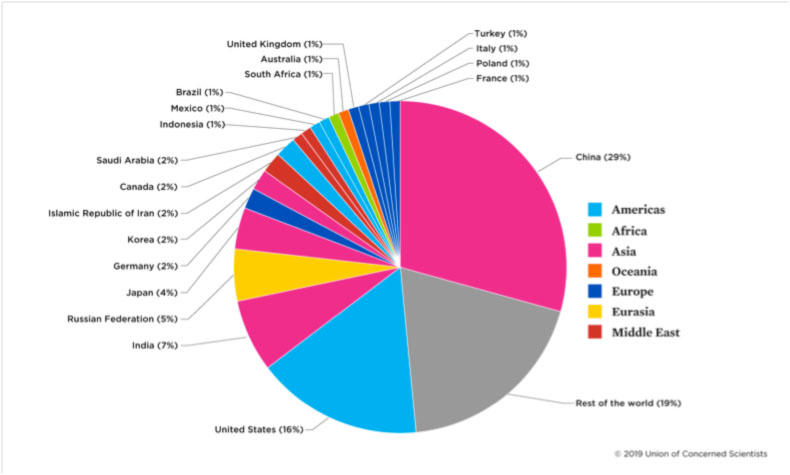The catastrophic implications of climate change and global warming are already upon us, as climate change experts have been warning for many years.
Man’s reckless exploitation and abuse of nature has finally caught up with us. In the last half-century, overconsumption and non-biodegradable waste production, the widespread use of fossil fuels, the rise in the scale of road and air travel, deforestation and fast paced urbanisation have brought nature to a tipping point.
The latest wildfires in Australia, which have led to the death of almost a billion animals and to the destruction of large tracts of Australian wildlife, are but one of the most devastating examples of things to come.
In his book, The Uninhabitable Earth, David Wallas-Wells warns us that climate change and rising temperatures will soon have a series of cascading consequences rendering planet earth uninhabitable. These include rising sea levels and flooding, water and food scarcity, rising pollution and declining air quality, the spread of disease, an increase in natural disasters and severe weather conditions, and finally rising levels of armed conflict.
Many of the anticipated effects of climate change and global warming have already started to materialise before our eyes in the last decade, and unless radical action is taken to counter climate change, the warnings of Wallace-Wells and others will become our new reality.
Over the past two decades, a global consensus began to emerge about the need to counter climate change. This consensus resulted in the signing of the Paris climate agreement in 2016. As of November 2019, 195 United Nations Framework Convention on Climate Change (UNFCCC) members have signed the agreement, and 187 have become party to it.
The Paris climate accords came to represent this emerging global consensus and many countries made pledges to take measures to curb their CFC emissions in an effort to contain global warming and to keep the increase in global average temperature to well below 2 degrees Celsius above pre-industrial levels; as well as to pursue efforts to limit the increase to 1.5 degrees Celsius, recognising that this would substantially reduce the risks and impacts of climate change. The measures taken by many industrialised countries to curb CFC emissions, though nowhere near what is needed to reverse climate change, nonetheless created a sense of optimism that the destruction of our planet might be averted.
However, the rise of right-wing nationalist-populist leaders and movements to power across the developed and developing worlds has dealt a major blow to humanity’s efforts to counter climate change. Nationalist-populist leaders such as Trump in the US, Morrison in Australia, and Bolsenero in Brazil, have made climate change denial a central part of their agenda and have aggressively curbed measures to counter climate change and have relaxed many of the regulations aimed at curbing CFC emissions in their countries. Moreover, these leaders, who are supported by big oil and gas companies, have favoured increased fossil fuel exploration and consumption over the drive to develop alternative and clean sources of energy.

Union of concerned scietest
The rise of right-wing leaders who embrace climate change denial represents the single most important challenge to the global drive to curb climate change and global warming.
Sadly, this gross failure in leadership comes at a time when we are beginning to witness first-hand the dramatic consequences of climate change and global warming. This has driven many young people around the world, especially in Western Europe, to take matters into their own hands. Led by the 16-year-old activist from Sweden, Greta Thunberg, who has become the face of a new youth-led movement to counter climate change, youth are mobilising in larger numbers to demand that their leaders take climate change seriously. Increasingly, climate change is becoming the central political question for many younger people in Europe and the US, and coming political battles will increasingly revolve around this issue.
Like the rest of the planet, Egypt and the Arab world are expected to suffer from the dire effects of climate change in the form of rising temperatures and rising sea levels, water and food scarcity, desertification, air pollution, disease and conflict. Many of these effects have begun to materialise. However, climate change and environmental issues do not occupy an important place in public discourse in this part of the world, and have not inspired the creation of environmental grassroots movements, even though many of the ongoing conflicts in this region have been indirectly triggered by water and food scarcity, including the conflicts in Iraq, Syria and Sudan. And though most countries in the Arab world have signed the Paris climate change accords, measures to curb CFC emissions have not been seriously undertaken.
Humanity has reached an important crossroads and the very survival of our planet will depend on what we do next. If right wing climate change denialism continues to rise, and leaders continue to ignore the signs and fail to adopt radical measures to curb CFC emissions, then our planet is doomed and, as Wallace-Wells warns, the earth will become uninhabitable.
However, if by some miracle, and through growing pressures exerted by climate change movements, leaders begin to take climate change seriously, perhaps we can save our planet. Aggressive measures need to be taken to encourage technological innovation, the use of renewable and clean energy, and reduced consumption and embark on behavioural change on the state and individual levels. Only by making climate change a priority issue on global and national agendas can we tackle this issue in a meaningful way. Recent measures taken by countries such as New Zealand to curb CFC emissions should stand as an example that the rest of the world should follow if we are serious about averting the death of our planet.
*The writer is a senior researcher at Al-Ahram Centre for Political and Strategic Studies.
*A version of this article appears in print in the 23 January, 2020 edition of Al-Ahram Weekly.
Short link: